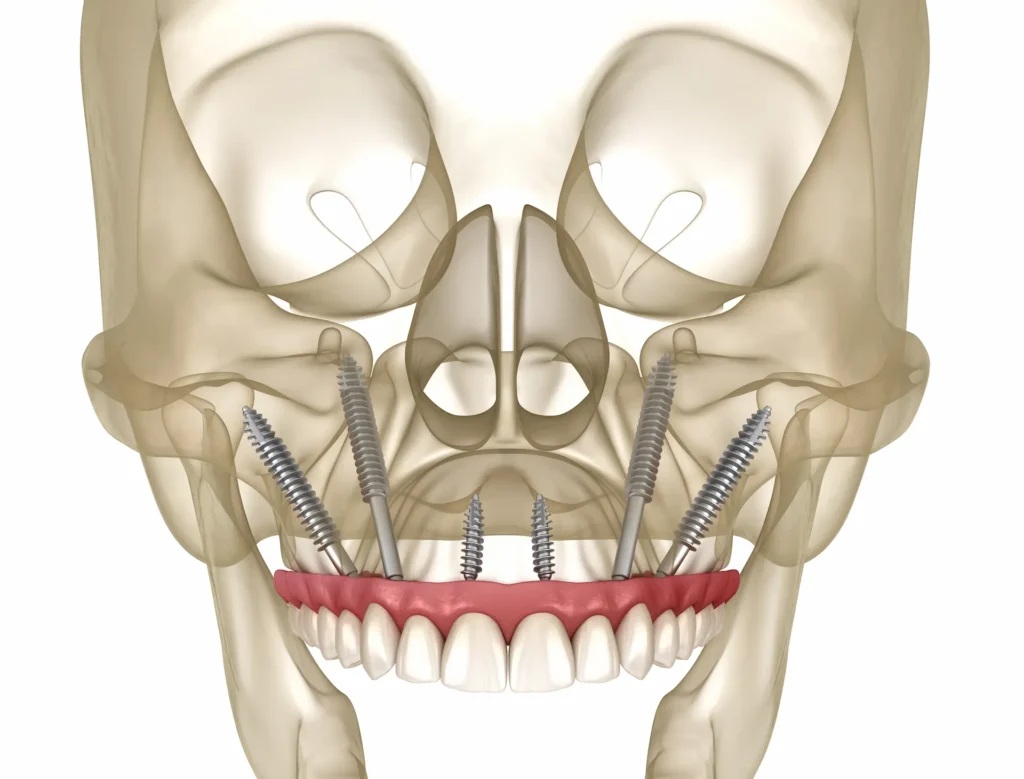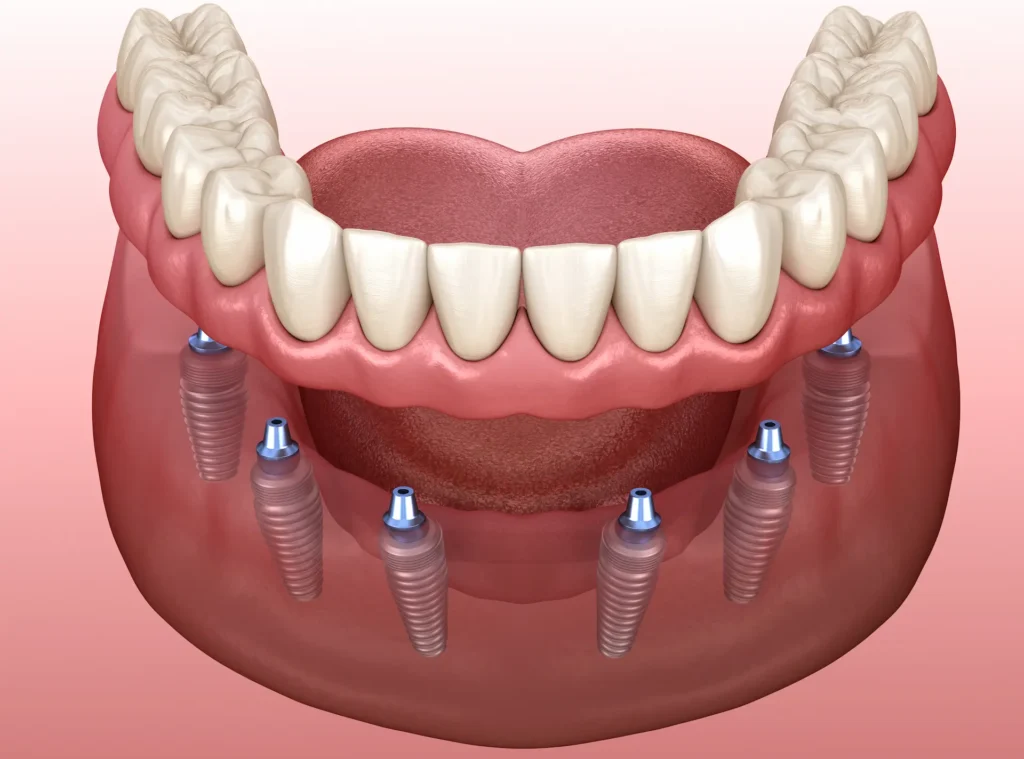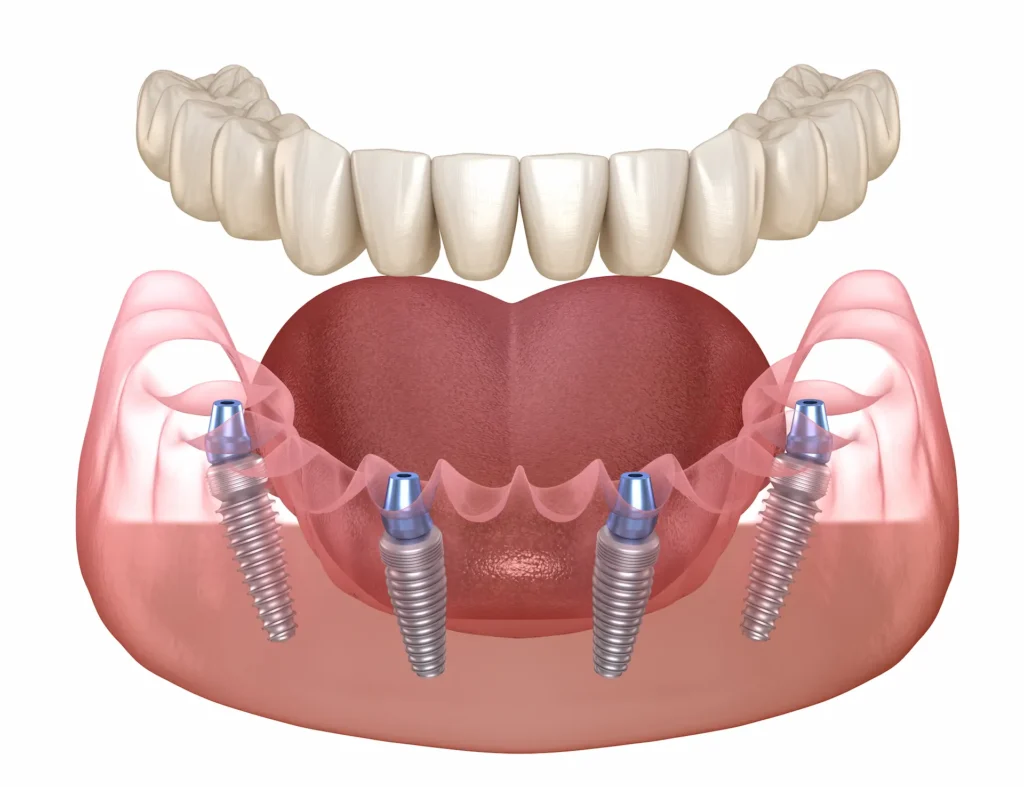If you need help choosing among the different dental implant types, you’re not alone. A good implant can be challenging to come by, and the wrong one can cause problems. So, if you need help selecting a digitized one, read on.
In this article, we’ll examine the main types of dental implants: endosteal, subperiosteal, and zygomatic. Understanding these implant types can help you find the right fit for your oral health needs.
Understanding Dental Implants
Dental implants are permanent, long-term replacements for missing teeth. They are an effective and safe solution that can improve the health and appearance of your smile. Made of titanium, they provide a strong, biocompatible material that integrates directly into the jawbone.
The implant then acts as an artificial root, securely holding a crown, bridge, or denture. Dental implants can restore the look and feel of natural teeth, making it easier to eat, speak and smile confidently.
6 Types of Dental Implants
There are a variety of dental implant solutions to meet your needs. These include Endosteal and Subperiosteal implants.
Endosteal implants are the most commonly used type of implant and involve placing an implant directly into the jawbone. Subperiosteal implants involve placing a metal frame on the jawbone, and the implant is placed on top of the frame.
1. Endosteal Implants
Endosteal implants involve placing a small titanium post into the jawbone. This titanium post acts as an artificial root and provides a solid foundation for the prosthetic tooth. The post is usually made of titanium, a biocompatible material that adheres to the bone and helps stimulate bone growth. This helps secure the implant in the jawbone.
The implant is then inserted into the jawbone and covered with a gum-like material before a prosthetic tooth is attached. Endosteal implants are inserted into the jawbone using a surgical procedure that typically takes less than one hour. The implant is inserted into the jawbone using a screw-like instrument and is left to heal for several weeks before the prosthetic tooth is attached.
Endosteal implants are a great option for any patient who needs to replace one or more missing teeth. Good candidates for this type of implant include those with strong jawbones and good oral health.
Pros
Endosteal implants offer many advantages, such as:
- Low risk of failure.
- An improved appearance compared to other types of implants.
- Highly customizable and can be used to replace single or multiple teeth.
Cons
The cons of endosteal implants include the following:
- A higher cost.
- A longer recovery time than other types of implants.
2. Subperiosteal Implants
Subperiosteal implants are a type of dental implant designed to be placed on the jawbone without any need for drilling or cutting.
They consist of a metal frame custom-made from the patient’s dental mold and designed to fit the patient’s jawbone. They are typically made of titanium or cobalt-chromium alloy and are inserted beneath the gum line. The metal frame of the implant sits on the jawbone and holds the artificial tooth securely in place.
Subperiosteal implants are inserted through a minor surgery, which is typically done under local anesthesia. The metal frame is attached to the jawbone with small screws during the procedure. The metal frame is then covered with gum tissue, and the artificial tooth is attached to the frame.
Patients who are good candidates for subperiosteal implants include those with weakened jawbones due to age, gum disease, or injury. People who cannot or do not want to undergo bone grafting or other more invasive implant procedures may also be suitable for subperiosteal implants.
Pros
The pros of subperiosteal implants include:
- Their minimally invasive nature.
- Ability to be used with weaker jawbones.
- Relatively low cost.
Cons
On the other hand, the cons include:
- Risk of the implant becoming loose over time.
- May not be as durable as other types of implants.
- Recovery time is typically longer than other types of implants.
3. Zygomatic Implants

Zygomatic implants are an advanced type of dental implant. These implants are designed to be used when other methods are unsuitable due to bone loss or lack of bone in the upper jaw.
Zygomatic implants are longer than traditional dental implants, and they are anchored to the cheekbone rather than the jawbone. This makes them a great option for people with severe bone loss in their upper jaw, as traditional implants may not be suitable.
Patients who are good candidates for zygomatic implants include those with severe jawbone loss, patients who may not be suitable for other types of implants, and those who need multiple implants, bridges, or full arches in the upper jaw. Zygomatic implants can also be used to replace missing teeth in the upper jaw and help stabilize dentures.
Zygomatic implants can provide a great solution for patients with severe jawbone loss or those who may not be suitable for other types of implants. Because of their longer length, they do provide more stability and durability. However, zygomatic implants can be more expensive than other types of implants, and the recovery time is typically longer.
4. All-on-4 Implants
All-on-4 implants are dental implants that are used to replace a full arch of teeth. This type of implant consists of four implants placed in the jawbone and acting as anchors for a permanent bridge.
The implants support the bridge and secure it in place. All-on-4 implants provide a permanent solution for missing teeth and do not require daily maintenance. This type of implant is often preferred over traditional dentures as it eliminates the need for adhesives and other daily maintenance.
All-on-4 implants differ from other types of implants in that they are designed to support a full arch of teeth. Traditional implants require multiple implants to support a single tooth, while all-on-4 implants are designed to support an entire arch of teeth with just four implants.
Patients who are missing multiple teeth, have a compromised jawbone, or are looking for a full smile makeover are typically good candidates for all-on-4 implants. Patients with strong jawbones and healthy gum tissue may also be good candidates for this type of implant.
Pros
All-on-4 implants offer several advantages over traditional dentures:
- They provide a more secure fit.
- Require less maintenance.
- Give a more natural look and feel.
They are designed to last a lifetime, eliminating the need for frequent replacement.
Cons
However, all-on-4 implants have the following disadvantage:
- May be less secure than all-on-6 implants.
These types of implants typically cost more than traditional dentures, and the healing process typically takes longer too. But if you can get around the initial disadvantages, the long-term benefits outweigh anything else.
5. All-on-6 Combination Implants
All-on-6 implants are dental implants that are used to replace a full arch of teeth. This type of implant consists of six implants placed in the jawbone and acting as anchors for a permanent bridge. All-on-6 implants provide a permanent solution for missing teeth and do not require daily maintenance.
They are often preferred over traditional dentures as they eliminate the need for adhesives and other daily maintenance. These implants differ from other types of implants in that they are designed to support a full arch of teeth. Traditional implants require multiple implants to support a single tooth, while all-on-6 implants are designed to support an entire arch of teeth with just six implants. All-on-6 implants are designed to fit securely and comfortably in the jawbone, which provides a more natural and aesthetically pleasing look and feel.
Patients who are missing multiple teeth have a compromised jawbone, or who are looking for a full smile makeover are typically good candidates for all-on-6 implants. Patients with strong jawbones and healthy gum tissue may also be good candidates for this type of implant.
All-on-6 implants offer several advantages over traditional dentures. They provide a more secure fit, require less maintenance, and give a more natural look and feel. They are also designed to last a lifetime, eliminating the need for frequent replacement.
Pros
The pros of all-on-6 implants include the following:
- A more secure fit than all-on-4 implants.
- Less maintenance.
- A more natural look and feel.
- They are designed to last a lifetime, eliminating the need for frequent replacement.
Cons
The cons of all-on-6 implants include the following:
- They may be more expensive than all-on-4 implants.
6. Mini Dental Implants
Mini dental implants are a type of dental implant, usually smaller than conventional implants, that are designed to replace one or multiple missing teeth. They are made of titanium and are surgically placed into the jawbone. Mini dental implants have several advantages over conventional implants, including less invasive placement and a faster recovery time.
Unlike conventional implants, mini dental implants do not require extensive jawbone preparation and can often be placed in a single visit. Mini dental implants are also more affordable than conventional implants, making them an attractive option for those seeking a more cost-effective solution.
Mini dental implants are a great option for those who want a less invasive implant option. They are ideal for those with limited jawbone density or wanting a faster recovery time. Mini dental implants can also be used in patients who are missing multiple teeth, as they can be placed quickly and easily.
These implants are a great option for those with limited jawbone density or who want a less invasive implant. Mini dental implants are smaller than conventional implants, making them easier to place with less surgical preparation. They are also less expensive than conventional implants, making them a more cost-effective option for those looking for a less invasive implant procedure.
Mini dental implants have several advantages, including:
- Less invasive placement.
- Faster recovery time.
- A more cost-effective solution.
However, there are also some potential drawbacks to consider:
- Mini dental implants have a slightly lower success rate than conventional implants and may not be suitable for those with severe jawbone deterioration.
- Mini dental implants may not provide as strong a foundation for the implant as a conventional implant would.
You can also expect a shorter recovery time than conventional implants, as they require less surgical preparation.
Comparing The Different Types of Dental Implants

When it comes to dental implants, a variety of types are available to suit different needs.
| Endosteal Implants | Subperiosteal Implants | Zygomatic Implants | |
| Implant placement location | In the jawbone | On the jawbone, under the gums | In the cheekbone, avoiding jawbone |
| Implant type | Most common type, screw or cylinder-shaped titanium | Plate-shaped, with posts extending through the gum tissue to hold dentures or bridges | Extended implant that reaches the zygomatic bone and cheekbone |
| Suitable for jawbone density | Need enough healthy bone for support | Suitable for individuals with insufficient bone mass or poor jawbone health | Suitable for individuals with severe bone loss or poor bone density |
| Procedure complexity | Simple and straightforward | More complex than endosteal implants | More complex than both endosteal and subperiosteal implants |
| Recovery time | Shorter recovery time than zygomatic implants | Moderate recovery time | Longer recovery time than other types of implants |
| Success rate | High success rate | Moderate success rate compared to endosteal implants | High success rate |
| Cost | Lower cost than zygomatic implants | More expensive than endosteal implants | Most expensive type of implant |
| Pros | Can support multiple teeth or a full arch of teeth | Suitable for patients with bone loss or poor bone density | Suitable for patients with severe bone loss or poor bone density |
| Cons | Requires healthy jawbone density | Requires more extensive surgery and longer recovery time | Most expensive option |
Some of the most common types of dental implants include endosteal implants, subperiosteal implants, and all-on-four implants. Endosteal implants are the most traditional type of implant and are placed directly into the jawbone.
Subperiosteal implants sit on top of the jawbone and are used when there is not enough bone in the jaw to support an implant. All-on-four implants are a popular option as they are permanent and provide a full arch of teeth, while Endosteal implants are the most common type of implant and are placed directly into the jawbone.
Factors to Consider When Choosing the Right Dental Implants

When considering the right dental implants, the following factors should be taken into account:
Type of implant
The type of implant will depend on the patient’s individual needs, such as the size, shape, and type of tooth. For example, a single tooth implant requires a smaller implant than one used to replace multiple teeth. The dentist can provide the necessary information and guidance to determine the most suitable type of implant for the patient.
The dentist’s experience
The dentist’s experience is essential to ensure the procedure is performed correctly and safely. The dentist should have experience in the type of implant being used and should have good reviews from past patients. A qualified dental implant specialist should also be familiar with the latest techniques and technologies for the best results.
The cost
The cost of dental implants will vary depending on the type and the dentist. Researching and comparing different dentists’ costs is important to get the best price. Insurance may also cover some of the cost depending on the type of implant and the patient’s plan.
FAQs
Which type of dental implants are best?
When deciding which type of dental implant is best for you, it is important to consider your individual needs and dental health. Hanna Dental Implant Center will help you decide which type of dental implant is the most suitable for you.
What are the two most common types of dental implants?
The two most common types of dental implants are endosteal and subperiosteal implants. Both of these types of implants provide a secure and permanent solution to replace the missing teeth.
Which are better mini implants vs. regular implants?
Mini implants are an excellent option for patients with difficulty with traditional implants due to bone loss in the jaw. Mini implants are inserted directly into the jawbone but are smaller and have a more straightforward procedure than traditional implants.
On the other hand, traditional implants are best for those who have enough bone to support them. They provide a strong and secure base for the replacement teeth and require fewer visits for treatment.
Can your mouth reject an implant?
It is rare for a dental implant to be rejected by the body. The implant is made of safe and accepted materials by the body. However, in rare cases, the implant can become loose or infected due to improper placement or a patient’s dental hygiene.
What dental implant services do you offer in your Houston clinic?
At Hanna Dental Implant Center, we offer a comprehensive range of dental implant services designed to meet your unique needs. Our services include:
- Full Mouth Dental Implants
- Dental Implant Tourism and Travel Package
- Zygomatic Implants
- Single Tooth Dental Implants
- Same-Day Implants
- Single Arch Dental Implants
- Multiple Dental Implants
- Mini Dental Implants
- Full on Five Dental Implants
- Denture Implants
- Implants with Sedation
- Dental Implant Bridge
- All on Six Dental Implants
- All on Four Dental Implants
- All on Eight Dental Implants
We are committed to delivering the best dental care and ensuring your comfort and satisfaction. For more information or to book a consultation, feel free to contact us.
Knowing Which Type of Dental Implant is Right for You
The two most common types of implants are endosteal and subperiosteal implants, and mini implants are available for those with bone loss in the jaw. Hanna Dental will assess your individual dental situation and discuss all possible risks before beginning the implant process.
At Hanna Dental Implant Center, we are a comprehensive implant center. We provide all treatments necessary for all implant-related procedures.
Our experienced team of professionals is here to help you make the best decision for your dental health and provide you with the highest quality of care. Contact us today for a free consultation to start your journey to a new, brighter smile!



